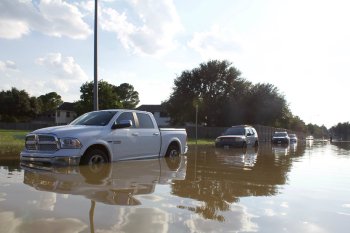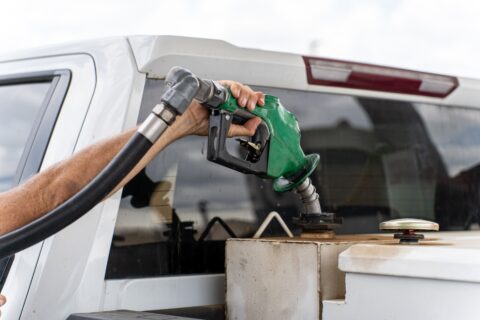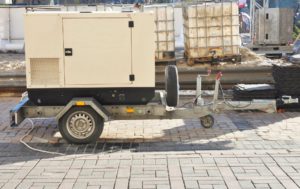Five Steps for Bulk Fuel Hurricane Preparedness | Ricochet Fuel distributors

Hurricane preparedness is crucial with hurricane season upon us. If you’re in Texas, Arkansas, New Mexico, Florida, Louisiana, New York, New Jersey, Virginia, South Carolina, North Carolina, Massachusetts, or Maryland, it’s vital to have a Business Continuity Plan (BCP) in place designed explicitly for fueling.
What is the fuel for a hurricane?
The main fuel for a hurricane is warm ocean water. When the water evaporates, it adds heat and moisture to the air, which helps the storm grow. The warmer the water, the more energy the hurricane gets. That’s why hurricanes often get stronger over tropical seas.
Why Does Your Business Need a Hurricane Preparedness Plan?
Having a hurricane plan isn’t just smart—it’s essential. It gives your business a clear path to stay safe, reduce damage, and get back on track quickly when the storm passes.
To make sure you’re fully prepared, let’s dive into the 5 key things you should do next.
5 Essential steps of a business for hurricane fuel preparation.
#1 – Line Up Your Bulk Fuel Suppliers Ahead of Time
Make sure your business continuity plan includes at least three bulk fuel suppliers, both local and out-of-area. This helps ensure you’re not relying on a single source during a crisis—especially if one refinery goes offline. Bulk fuel delivery plays a key role in emergency response, so it’s important to confirm your account is active and in good standing with each vendor before hurricane season starts. Also, make sure they have your most up-to-date access details like gate codes and emergency contacts.
#2 – Fuel in Emergencies: Supporting Critical Operations
In this aftermath of hurricanes, public fuel supplies are usually less accessible due to communication and mobility hassles. Plus, to add to your hassle list, lots of gas stations might be closed, out of power, or even empty in certain cases. However, emergency fuel storage and bulk fuel delivery will be your ultimate companion in this disaster. Remote fueling solutions keep all your critical systems, such as hospitals, police and fire departments, emergency air rescue, and construction and recovery, active till the last moment to ensure smooth continuity of all the essential services even in the worst conditions.

#3 – Lessons Learned from Past Disasters
Whether it was Hurricane Sandy in 2012 that didn’t even show mercy on a metropolis like New York or Texas’s 2021 winter storm, the takeaway was crystal-clear – if your team is waiting until the storm hits, then it’s already too late for both your operations and people.
Therefore, lots of cities and organizations that had prearranged fuel management during storms, including trusted suppliers and secured bulk fuel on-site before the disaster, recovered significantly faster and served communities more efficiently. Plus, always remember that a long-term partnership with trusted suppliers, such as Ricochet Fuel Distributors and strategic preparation are your ultimate keys to combating the next crisis.
#4 – Plan for Hurricane Business Services
Make a list of all possible disaster expenses and create an internal cost sheet, vendor list, and purchase order plan. Being organized financially will make any unplanned and unusual purchases less stressful. FEMA also has a very thorough Business Contingency Plan you can download.

#5 – Make Sure Your Personnel Is Ready in Case of Disaster
Designate specific personnel that can be available 24×7 to help facilitate vendor response.
Giving your staff specific natural disaster duties and drilling these duties beforehand is vital.
Then, when a hurricane hits – everyone knows what to do and how to help facilitate their fuel providers and other vendors.
What do you need for hurricane preparedness?
Hurricane readiness is not only about top-notch equipment and high-quality fuel but also about your team, your people. Thus, an effective emergency action plan becomes more than crucial while using a construction site fuel tank to ensure the overall job site safety. Plus, every worker must have easy access to a detailed, easy-to-follow disaster protocol that specifically includes safe evacuation routes, shelter-in-place instructions, and all the necessary fuel safety guidelines to ensure minimal damage to both your resources and team members.
Nevertheless, a practical fuel tank disaster readiness plan also includes posting all the emergency contact numbers, professional training for fire, fuel, and chemical safety, scheduled drills for real-time readiness, and practical action steps for securing diesel storage for emergencies. Moreover, documenting every emergency scenario, such as what happened, how your team members responded, and what was done during post-emergency hours, is also a must-do to support your insurance claims and other future planning.
Let’s see what we should consider for the emergency hurricane preparedness checklist.
Your emergency supply plan should cover both personal kits for employees and facility-level supplies to keep everyone safe and supported during a hurricane.
Employee Emergency Kit
Each employee should have a personal kit with essentials to last at least for 3 days:
Water – 1 gallon per person per day
Non-perishable food – High-energy snacks, canned meals, protein bars
Hygiene items – Toothbrush, toothpaste, soap, hand sanitizer, wipes, feminine products
Medications – 7-day supply of prescriptions and necessary medical equipment (inhalers, EpiPens, insulin)
Cash – Small bills and coins (in case ATMs are down)
Important documents – Copies of ID, insurance, emergency contacts, and prescriptions (in a waterproof pouch)
Flashlight and extra batteries
Facility-Level Emergency Supplies
Keep these in a secure, accessible location to support all on-site staff for 3–5 days:
Emergency water – 1 gallon per person per day, plus extra for sanitation
Bulk food supplies – Freeze-dried meals, canned goods, energy bars
Coolers and ice packs – For perishable items or medication storage
Backup generator – With enough fuel for at least 72 hours
First aid supplies – Fully stocked and easily accessible
Extension cords and power strips – For safe equipment use
Emergency lighting – LED lanterns, rechargeable lights, glow sticks
Cleaning supplies – Disinfectant wipes, garbage bags, gloves, paper towels
Fire extinguishers – Up to date and in multiple areas
What you have to do during the storm?
If your business plans to shelter in place during a hurricane, it’s crucial to stick to key safety steps. As part of your hurricane preparedness for businesses, make sure staff stay clear of windows and exterior walls, keep emergency supplies close, and monitor updates through battery-powered radios. During hurricane season, a diesel tank for backup power should be checked and ready. Follow local emergency instructions, including shutting off utilities if advised—and above all, stay inside until officials say it’s safe to leave.
Ricochet Fuel is Here to Help in Case of Disaster
Hurricanes and natural disasters are not are created equal. And, most of the time they are unpredictable. Along with that, each hurricane category and its landfall can affect logistics and supply differently. For example, fuel supply in the Gulf of TX might be cut off, but that may not happen in other landfall locations. Each area is different whether local or statewide all across Texas, Arkansas, New Mexico, Florida, or Louisiana. Don’t forget, refinery shutdown is a real possibility like what we saw during Harvey and Ike. In hurricane season, you need to prepare for an impact on fuel supply.
Ricochet Fuel is here to assist your business with their fuel needs and hurricane fuel preparation any way we can. Contact us today.
FAQs
1. Why is bulk fuel so important during a hurricane?
During a hurricane, power outages are common and can last for days. If your business relies on generators, trucks, or machinery, having bulk fuel on hand means you can keep things running when fuel stations are closed or out of supply. It’s not just about staying open—it’s about keeping your operations safe and ready to respond when others can’t.
2. How much fuel should we store before a storm?
It depends on the size of your operations, but a good rule is to have enough fuel to power your generators and critical equipment for at least 72 hours. For some businesses, that might mean topping off a diesel tank or securing an extra delivery before the storm hits. Always store it safely, away from high-risk areas, and keep it properly labeled and secured.
3. What should we check before using stored fuel?
Before a storm, inspect your fuel tanks for leaks, check levels, and make sure your fuel is clean—no water or sediment. Test your generators too, so you’re not caught off guard. This should be part of your regular hurricane preparedness for businesses checklist. Taking 10 minutes to double-check now can save hours of trouble later.
4. How to prepare your fuel tank for hurricane season?
To prepare your fuel tank for hurricane season, check for leaks, top it off to avoid condensation, and ensure it’s securely anchored and labeled. Also, test any connected equipment like generators to make sure everything runs properly.


